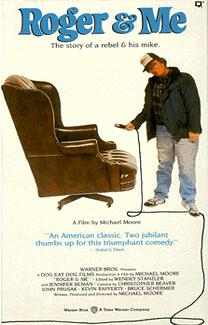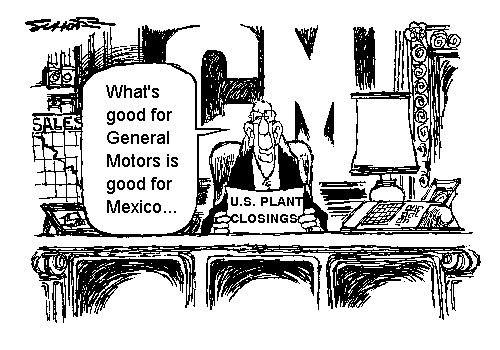Reviewing the documentary "Roger and Me"
Walter Jensen
|
Film Statistics
|
 |
The film "Roger and Me," by Michael Moore, shows how and why our society is critically flawed. Moore uses dialects, through the medium of film, to show the true face of the reality we call capitalism. I am defining dialectics as being the systematic analysis of the tension, inconsistencies, interconnections, and/or contradictions between opposites. The plot of the film revolves around Moore's quest to confront Roger Smith, the CEO of General Motors (GM) at that time, and to bring him to Flint, Michigan, to see what his actions have done to the people who work and live in the surrounding area. Smith clearly did not want to be interviewed by Moore and the film quickly reveals why. Moore's film is a composite of stock footage from documentaries about GM, documentaries about Flint, TV news footage, film footage he took recording the plant closings, and his search for Roger Smith. Moore rarely has to use narration to his tell story; his points are made painfully clear from just his film footage.
The beginning of the film starts with a quick history of Flint and the prosperity achieved by the endeavors of employees of General Motors and the UAW. Despair sets in when GM's board of directors, led by Roger Smith, decides to maximize shareholders's profit potential with massive layoffs and plant closings in and around Flint. These jobs and factories would be, and have been, moved to Mexico to drastically reduce the wage and benefit expense of GM. To show that not every American is socially brain washed into believing that global competition and corporate downsizing is good for America, I site the following example. During one part of the film, as a majority of GM employees are cheering as the last truck rolls off the assembly line, a male GM employee comments, "Why are they cheering? They've just lost their jobs."
This despair turns to hope when the city leaders attempt to make Flint a tourist trap as one way of generating new jobs and revenue. The humor becomes more painfully funny when public leaders give their reasons how they used (more like wasted) millions of dollars in reckless attempts to revive the city's economy. The city builds the Hyatt Regency, a new shopping center, and "AutoWorld." AutoWorld was an indoor theme park about the history of the automobile. One of the main features of AutoWorld was a show produced by GM involving an animatronic puppet of an autoworker that sung a love song to a robotic arm. What is ironic is the fact that robotic arms have replaced the jobs of thousands autoworkers in the last 30 years. We can only speculate why GM would add pain upon injury with this puppet show. Moore compares this "park" to building "ExxonWorld" in Alaska or "ChemicalWorld" in New Jersey. He also shows how ridiculous GM spoke-people sound in their own words, as they justify killing off the city of Flint. Moore closes this section of the film by showing how the Hyatt Regency, the new shopping center, and AutoWorld, go bankrupt within the first year of their grand openings.
At this point in the film, all hope is completely destroyed. People begin to leave Flint for employment in other states. Crime reaches the highest level in the nation and the rat population supersedes that of human population in the city of Flint, something that is not common in US cities. Ex-GM workers find employment as prison guards and discover that they are locking up their former co-workers. Rampant crime leads to prison over-crowding and Flint is forced to build a new jail facility. As an unforeseen insult, prior to the opening of the new jailhouse the "well off" host a party where guests may spend a night in new jail for $100. Moore's dialectical ability to expose the truth between the people celebrating the opening of the new jail and the facts that surround the reason that new jail must be built is the work of pure genius. The ultimate injury occurs when ABC comes to broadcast "Nightline" live from Flint. This never comes to be because an unemployed Flint autoworker steals the ABC broadcasting truck before the program can really begin.
During the course of the film, whether intentional or not, Moore seems to catch many people at their worst, of instance, Pat Boone, Bob Eubanks, Miss Michigan, Anita Bryant, and Christian fundamentalist - Robert Schuller. Schuller was spreading the messages of witless optimism; he was as effective as a doctor trying to resuscitate a little girl after she had been dead for three days. When people are in real trouble there is little that can be said to make the situation better and Moore's camera focuses on this reality.
The dialectics between the woman who raises rabbits for income and what Roger Smith did to the people of Flint, sums up the relationship between the employer and their employees. The rabbit woman states she raises the rabbits to the age of four months and then kills them; that way, they are nice and tender. At one point in the interview, she is holding a rabbit, caressing it ever so softly and then states indirectly that this one will be her dinner. She proceeds to kill, skin, and gut the rabbit in front of the camera. This leaves a haunting visual image in the mind of the viewer, showing that there is no difference from what GM has done to Flint and what she does to rabbits. What employers can not understand is that human beings are not like rabbits and should not be treated as such.
Moore has been criticized for his one-sided attack on American stockholders because, according to them, he is neglecting to show the whole truth. Other critics state that his film techniques are designed to darken your emotions against corporate America. If I may be so bold as to respond to these criticisms on Moore's behalf, using a line from Jack Nicholson, "You can't handle the truth!" Now days no one wants to hear the truth because it is too painful. No one wants to be shown that their parents', siblings', or grand parent's investment strategies destroy other human beings' careers, take away their homes or rental property during the Christmas season, and destroy their very lives. This is not self-preservation on the part of the stockholder, where the stockholder must maximize profit potential or they will loss their homes or their very lives; this is just simple greed! The myth perpetuated by capitalists, that people invest in the stock market to cause job growth, is just that, a myth. People invest in the stock market to make money the old fashion way, off the backs of other human beings who do all the work. If this film was made to challenge the most closed-minded capitalist to rethink their present position on our economic system, I say "Great!" It is about time that Americans understand that you can't get something for nothing. Moore shows the true nature of the employers' miserable indifference to their employees. In the employer's mind, as long as they cannot see or feel what maximizing shareholder's profit potential does, everything is right in the world. This is a fair documentary about life in America and the film's emotional effects are justified. Moore has succeeded in making Roger Smith a national villain, and rightly so.
When it concerns jobs within a country, supreme executive power derives from a mandate from that countries citizens, not from the corporations. Corporations, especially Corporate America, can not expect to wield total economic power over the livelihood of the world work force because that is what is best for the stockholder's profit margin. Why do we continue to allow corporations to supercede the right to live, liberty, and the pursuit of happiness for the individual in favor of the stockholder? How can the employees even know what their rights are, if they are working in excess of 50 hours a week?
Isn't it about time we start changing the basic structure of corporate America? Maybe we should make it illegal for US corporations to own or lease, stock or property in foreign countries. And by the same token, to keep foreign corporations from manipulating the US economy, foreign corporations can not own or lease, stock or property in America. This way we could reverse the trend of outsourcing jobs to the cheapest third world country, force corporations to start manufacturing products within their own nation, and stop corporations from dictating policy in their own country and other nations.
Sub-note: In the contract with Warner Brothers involving the first film, Moore demanded several conditions before he would allow his film to be distributed. The most famous is the place card on one of the theatre seats that reads "Reserved for Roger Smith, Chairman of General Motors" and that Warner would pay rent for all families evicted in the film. There is a 1992 sequel which shows how Michael's life was affected after the film came out.
